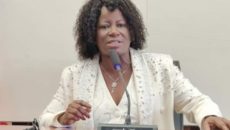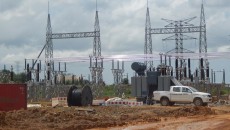MONROVIA, Montserrado – The United States Embassy, on behalf of western development partners in Liberia, has issued a warning to the Liberian government against a plan to contract a company to provide a ship that would generate electricity.
The diplomatic note, which was intended to be private but was leaked to the press, was signed by six ambassadors from the U.S. and European countries, in addition to the European Union ambassador and the World Bank country manager.
According to a draft contract first leaked by FrontPage Africa, the government had planned for a Turkish company called Karpower to station a floating barge at the Freeport of Monrovia over a 10-year period and provide 36 MW of electricity.
Under the agreement, Liberia would purchase electricity supply from the private company, even though the country’s current energy consumption rate is far lower than what it is producing.
The rehabilitation of the Mount Coffee Hydropower Plant means that Liberia now has an installed capacity of 88 MW from hydropower and additional 38 MW produced from thermal plants, bringing the Liberia Electricity Corporation’s total capacity to 126 MW. However, the most the country uses at a time is only 31 MW or 24 percent of the total installed capacity.
The government’s move to obtain surplus power appears to stem from a need to close a gap during the dry season when water levels at the hydropower plant drops, reducing the capacity of the dam. However, the partners noted in their letter that the gap lasts for only up to 20 weeks every year and is no more than 15 MW. They feared that such a move would bring “unnecessary debt in the millions of dollars that would result in higher prices for consumers.â€
They pointed out that the solution to that problem “cannot be a decade-long, year-round financial commitment to purchase 36 MW of power and fuel to keep a power barge running 24/7.â€
Instead, the ambassadors suggested “practical solutions†such as combining the use of the hydropower plant and the heavy fuel oil thermal power plants at Bushrod Island. They also suggested managing demand by having large commercial users switch back to self-generation in the dry season.
The ambassadors further noted that the problem was temporary, and would last until 2020, when a power agreement between the Mano River Union countries would be operational. The U.S. Embassy and its partners appealed to the government to take steps to safeguard investments in the sector.
According to the letter, partners have committed US$825 million to the electricity sector.
“If successful, these projects will transform the lives of millions of Liberians and underpin economic growth urgently needed to achieve President Weah’s pro-poor agenda,†the statement read.
Meanwhile, the partners urged the government to address key challenges facing the sector, including the delinquency on the part of government entities to pay their electricity bills. As the government is the largest electricity customer, this means that the Liberia Electricity Corporation cannot get the needed funding to maintain operations.
They also noted that high commercial loses “nullify rewards of lower cost energy generated by Mt. Coffee.†These losses are likely a reference to the high incidence of power theft.
The key development partners also noted that the government was deviating from the terms of a management services contract signed with an interim management team. However, they did not detail what these deviations were.
“Without the government’s positive engagement of these issues, it would be difficult to sustain the unprecedented level of coordinated support for Liberia’s electricity sector,†the statement concluded.
The European ambassadors who signed the statement were from Germany, Great Britain, Sweden, Ireland, and Norway.
It appears that the letter may have had its intended effect, as a source present at a Liberia Electricity Corporation board meeting on Friday, July 18, the same day the diplomatic note was released, said the barge proposal has been scrapped.
Featured photo by Jefferson Krua



